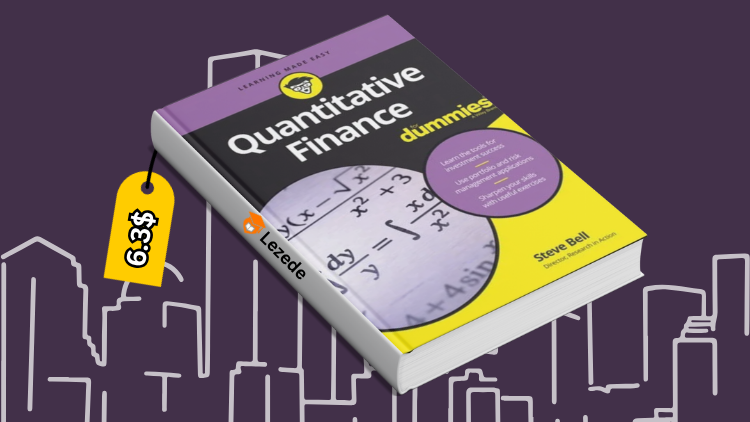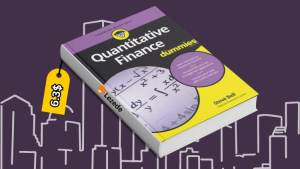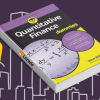Free Download CFA Core Video on Quantitative Finance by Connel Fullenkamp
Check content proof, now:
REVIEW – Connel Fullenkamp’s assessment of the CFA Core Video on Quantitative Finance
Understanding the mathematical components is crucial for both new and seasoned employees in the ever-changing world of finance. One comprehensive resource created to meet this knowledge demand is Connel Fullenkamp’s CFA Core Video on Quantitative Finance. The complexity of the video is examined in this assessment, along with its content, target audience, and unique selling point. Whether you are a CFA candidate or just interested in mathematical finance, this video attempts to help you better comprehend complex financial models and ideas.
A Comprehensive Analysis of Mathematical Finance
A thorough study of quantitative finance, a crucial component of modern financial analysis and decision-making, is given in the CFA Core Video on Quantitative Finance. Numerous mathematical methods are used in mathematical finance to address financial problems, providing a methodical foundation for understanding asset valuations and market movements.
The main focus of this film is a thorough examination of the basic theorem of arbitrage-free pricing, which ensures that arbitrage opportunities are eliminated in a market that functions efficiently. Fullenkamp gives viewers the fundamental understanding needed to understand asset pricing in equilibrium by explaining this theorem.
The Black-Scholes equation, a fundamental model in option pricing, is also examined in the film. This formula has revolutionized derivatives valuation and has important ramifications for strategic trading and risk management. Fullenkamp’s explanation makes the complex mathematics of the equation understandable to those with varying degrees of mathematical expertise.
Principal Subjects Addressed
The CFA Core Video curriculum on Quantitative Finance is systematically organized to encompass a variety of fundamental subjects crucial for studying quantitative finance. The following is a summary of the principal topics discussed:
- Arbitrage-Free Pricing: Comprehending the prerequisites that eliminate arbitrage opportunities, hence guaranteeing equitable and efficient markets.
- Black–Scholes Equation: An in-depth examination of the model’s derivation, assumptions, and applications in derivative valuation.
- Financial Market Dynamics: Examination of the capacity of mathematical models to forecast and elucidate the fluctuations and trends in financial markets.
- Mathematical Theories and Models: Examination of diverse theories that underpin quantitative finance, enabling sophisticated financial analysis.
- Differentiation Between Economists and Mathematicians: Comparative analysis of the divergent methodologies employed by financial economists and mathematicians in their examination of market pricing and structures.
This method guarantees that learners comprehend the theoretical foundations while also recognizing their practical applications in real-world contexts.
Intended Audience: CFA Candidates and Enthusiasts of Quantitative Finance
The video is specifically tailored for CFA candidates preparing for the challenging examinations that assess their financial expertise and analytical skills. Its significance transcends mere examination preparation. Individuals with a strong interest in quantitative finance will find the material equally advantageous, as it connects theoretical understanding with practical application.
The movie highlights mathematical theories and models that support financial markets, providing viewers with skills to assess and forecast market dynamics effectively. This dual emphasis guarantees that students are adequately prepared to address both the theoretical and practical problems in the discipline.
Furthermore, by emphasizing the divergent methodologies of financial economists and mathematicians, Fullenkamp offers a comprehensive perspective on the financial world. This differentiation is essential for professionals seeking to specialize or collaborate across several sectors within finance.
Distinction Between Financial Economists and Financial Mathematicians
A unique aspect of the CFA Core Video on Quantitative Finance is its exploration of the contrasting methodologies between financial economists and financial mathematicians. This differentiation is pivotal in understanding the multifaceted nature of financial analysis and market evaluation.
- Financial Economists: Focus primarily on the structural reasons behind market prices, delving into the underlying economic factors that influence asset valuations. They analyze market trends, economic indicators, and policy impacts to derive insights into price movements and market health.
- Financial Mathematicians: Rely heavily on mathematical calculations based on observed prices. Their approach is more quantitative, utilizing complex models and algorithms to forecast market behaviors and price derivatives accurately.
By elucidating these distinct perspectives, Fullenkamp underscores the importance of an interdisciplinary approach in finance. Professionals equipped with both economic intuition and mathematical prowess are better positioned to navigate and influence the intricacies of financial markets.
Course Design and Content
The CFA Core Video on Quantitative Finance is meticulously crafted to enhance the viewer’s understanding of the quantitative aspects of finance. The course seamlessly integrates elements of computational finance and financial engineering, ensuring a comprehensive learning experience that balances both theoretical models and practical applications.
Key features of the course design include:
- Structured Modules: Each module focuses on specific topics, allowing learners to build their knowledge systematically.
- Real-World Applications: Practical examples and case studies illustrate how theoretical concepts are applied in actual financial scenarios.
- Interactive Elements: Engaging exercises and quizzes reinforce learning and aid in the retention of complex concepts.
- Expert Insights: Connel Fullenkamp brings his expertise to the forefront, providing nuanced explanations and industry perspectives that enrich the learning experience.
This balanced approach ensures that learners not only understand the mathematical foundations but also appreciate their significance in real-world financial operations.
Accessibility and Features
Accessibility is a key strength of the CFA Core Video on Quantitative Finance. Recognizing the diverse needs of its audience, the course is available for digital download, allowing students and professionals to access the material at their convenience. This flexibility is particularly beneficial for individuals juggling multiple commitments or residing in different time zones.
Additional features enhancing the user experience include:
- SSL Encryption: Ensures secure payments, providing peace of mind to users during transactions.
- Discount Codes: Users have the opportunity to redeem discount codes, making the course more affordable and accessible to a broader audience.
- User-Friendly Interface: The platform is designed for ease of navigation, enabling learners to focus on the content without technical hindrances.
These features collectively contribute to a seamless and secure learning environment, encouraging continuous engagement and progress.
Useful Applications and Importance
The CFA Core Video on Quantitative Finance’s inherent worth lies in its ability to translate complex mathematical concepts into useful financial tactics. The course gives students a thorough knowledge of models including the fundamental theorem of arbitrage-free pricing and the Black-Scholes equation, empowering them to make informed decisions in a variety of financial situations.
Experts who trade derivatives can use the Black-Scholes model’s insights to more accurately price options and effectively manage associated risks. Similarly, risk management experts may use arbitrage-free pricing principles to identify and mitigate any market inefficiencies.
The emphasis on the distinction between mathematicians and financial economists encourages a multidisciplinary approach, which improves teamwork and innovation in financial teams. Addressing the myriad problems in today’s financial system requires this all-encompassing perspective.
Feedback and User Experience
Despite the lack of thorough user feedback, the CFA Core Video on Quantitative Finance’s layout and content inherently suggest a positive user experience. The course’s comprehensive coverage of foundational topics, along with its real-world applications and protected access features, make it a reliable and effective learning tool.
Potential users can anticipate a well-planned and engaging training program that will enhance their overall proficiency in quantitative finance in addition to preparing them for CFA exams. The ability to use the internet adds to the appeal of the course and makes excellent training available regardless of geographic restrictions.
Final Evaluation
Connel Fullenkamp’s CFA Core Video on Quantitative Finance is a great tool for anyone looking to improve their understanding of mathematical finance. The movie thoroughly covers important topics including arbitrage-free pricing and the Black-Scholes equation, giving students the theoretical knowledge and real-world skills they need to navigate today’s financial markets.
The course offers a balance of mathematical theories and real-world applications for comprehensive comprehension, making it ideal for CFA candidates and enthusiasts of quantitative finance. The material is improved by distinguishing between the approaches of financial economists and mathematicians, which fosters the multidisciplinary viewpoint necessary for success in the financial sector.
Additionally, the course’s accessible features—such as digital downloads and secure payment options—make it an easy and handy option for a wide range of users. For anyone looking to succeed in quantitative finance, Connel Fullenkamp’s CFA Core Video on Quantitative Finance is a priceless resource that provides the knowledge and skills necessary to succeed in a data-driven financial setting.












